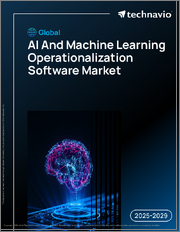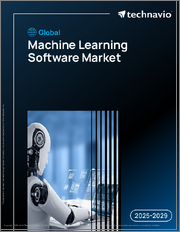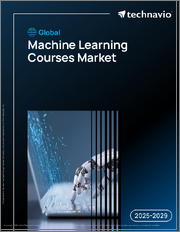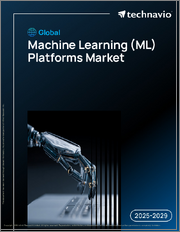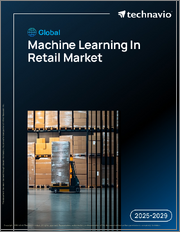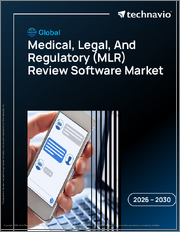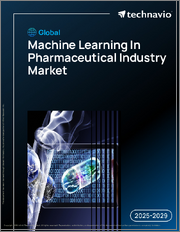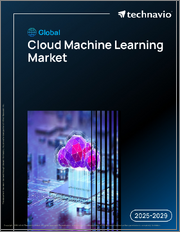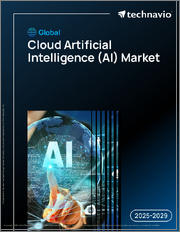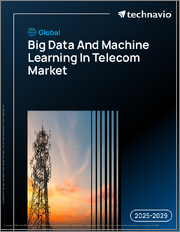
|
시장보고서
상품코드
1857682
자동 머신러닝 시장 : 컴포넌트, 도입 형태, 업계별, 조직 규모, 용도별 - 세계 예측(2025-2032년)Automated Machine Learning Market by Component, Deployment Mode, Industry Vertical, Organization Size, Application - Global Forecast 2025-2032 |
||||||
자동 머신러닝 시장은 2032년까지 연평균 복합 성장률(CAGR) 36.81%로 271억 5,000만 달러에 이를 것으로 예측됩니다.
| 주요 시장 통계 | |
|---|---|
| 기준 연도 : 2024년 | 22억 1,000만 달러 |
| 추정 연도 : 2025년 | 30억 2,000만 달러 |
| 예측 연도 : 2032년 | 271억 5,000만 달러 |
| CAGR(%) | 36.81% |
자동화된 머신러닝이 더 빠르고, 재현 가능하며, 관리 가능한 AI 성과를 원하는 조직에게 전략적 우선순위가 된 이유를 설명하는 경영진 소개
자동화된 머신러닝은 기술적 호기심에서 조직이 예측 시스템을 설계, 제공, 확장하는 방식을 재구성하는 전략적 수단으로 빠르게 전환하고 있습니다. 이 소개에서는 오늘날 자동화된 머신러닝이 왜 중요한지, 데이터 성숙도, 가속화되는 컴퓨팅 가용성, 반복 가능하고 감사 가능한 모델 개발에 대한 수요 증가의 교차점에 위치하여 종합적으로 설명합니다.
분석 이니셔티브의 가치 창출 시간 단축의 필요성, 모델 거버넌스 및 재현성 개선에 대한 압박, 데이터 사이언스 팀과 비즈니스 부문 이해관계자 모두에게 자동화가 매력적인 전문 인력 부족 등 여러 가지 이유가 있습니다. 자동화된 파이프라인은 기능 엔지니어링, 모델 선택, 하이퍼 파라미터 튜닝, 배포의 모범 사례를 체계화하면서 수작업으로 인한 실험의 오버헤드를 줄여줍니다. 그 결과, 조직은 저수준의 알고리즘 튜닝에서 문제 설정, 결과 측정, 운영 통합과 같은 고차원적인 작업으로 초점을 옮길 수 있습니다.
도입은 또한 도입 의사결정을 계속 형성하고 있는 마찰점을 인식하고 있습니다. 데이터 품질과 거버넌스는 여전히 핵심 과제이며, 레거시 시스템 및 부서 간 통합의 복잡성으로 인해 진행 속도가 느려질 수 있습니다. 또한, 투명하고 설명 가능한 모델의 필요성으로 인해 규제 환경에서 허용되는 자동화 접근 방식이 점점 더 제한되고 있습니다. 그럼에도 불구하고, 머신러닝 자동화를 신중하게 도입하면 분석 역량을 민주화하고, 부족한 기술자의 생산성을 향상시키며, 이용 사례와 업종에 관계없이 보다 일관된 결과를 도출할 수 있습니다.
자동화된 머신러닝 생태계와 기업 채택 경로를 극적으로 변화시키는 주요 기술적, 운영적, 규제적 변화에 대한 심층적인 연구
기술 성숙, 새로운 운영 패러다임, 진화하는 규제에 대한 기대에 힘입어 자동화된 머신러닝 환경은 혁신적인 변화를 맞이하고 있습니다. 대표적인 변화로는 모델 선택에 그치지 않고 지속적인 모니터링, 드리프트 감지, 재교육 오케스트레이션, 통합 관측 가능성까지 확장되는 엔드투엔드 모델 라이프사이클의 자동화가 있습니다. 이러한 라이프사이클 자동화를 통해 운영의 신뢰성을 높이고, 대규모 프로덕션급 배포를 가능하게 합니다.
동시에 모델 개발의 민주화로 인해 분석 워크플로우에 도메인 전문가가 직접 참여할 수 있게 됨에 따라 팀 구조와 기술 요구사항이 변화하고 있습니다. 민주화는 거버넌스와 해석 가능성을 위한 가드레일을 유지하면서 실험을 간소화하고, 로우코드와 노코드의 인터페이스를 통해 강화됩니다. 인프라 수준에서 클라우드 네이티브 아키텍처와 엣지 컴퓨팅 패턴은 모델을 데이터와 사용자에 더 가깝게 배치하여 지연 시간과 비용 부담을 줄이는 분산 훈련 및 추론 전략을 가능하게 합니다.
설명 가능성, 공정성, 프라이버시 보호 기술은 주변적인 관심사에서 핵심 설계 요구 사항으로 전환되어 벤더의 로드맵과 기업의 선택 기준을 형성하고 있습니다. 규제 당국의 감시와 이해관계자들의 기대도 투명한 감사 추적과 모델 결정의 검증 가능한 체계를 강화하는 데 일조하고 있습니다. 또한, 오픈소스 혁신과 벤더 간 상호운용성은 제어, 성능, 비용의 균형을 맞추는 하이브리드 배포 모델을 장려하는 동시에 보다 빠른 기능 채택에 기여하고 있습니다. 이러한 변화는 전체적으로 자동화된 머신러닝을 좁은 알고리즘 툴킷이 아닌 통합된 엔지니어링 및 거버넌스 규율로 재조명하는 것입니다.
2025년 컴퓨팅 및 하드웨어 공급망의 관세별 변화가 자동화된 머신러닝을 위한 조달, 도입 경제성, 공급업체의 제공 제품에 어떤 변화를 가져왔는지 전략적으로 분석합니다.
2025년 고성능 컴퓨팅 부품 및 관련 하드웨어 공급에 영향을 미치는 관세 조치는 자동화된 머신러닝 이니셔티브의 경제성 및 배포 전략에 영향을 미치는 파급 효과를 낳았습니다. 수입 가속기 및 특수 서버 부품의 관세 인상으로 인해 획득 비용이 상승하고, 기업들은 모델 훈련 및 추론에 사용되는 컴퓨팅 구성 요소를 어디서, 어떻게 공급받을지 재검토해야 하는 상황에 처했습니다. 이에 따라 많은 기업들은 비용을 운영 지출 모델로 전환할 수 있는 클라우드 기반 매니지드 서비스로의 전환을 가속화하고 있습니다. 또한, 하이브리드 계약에 대한 협상을 통해 기밀성이 높은 워크로드는 사내에 보관하고, 갑작스러운 훈련 피크에는 퍼블릭 클라우드의 용량을 활용하기로 결정했습니다.
하드웨어 조달이 둔화되면서 효율성을 중시하는 소프트웨어 혁신에 대한 관심도 높아졌습니다. 모델 압축 기술, 보다 효율적인 학습 알고리즘, 적응형 샘플링 전략은 컴퓨터 소비를 줄이는 실용적인 수단으로 주목을 받았습니다. 동시에, 조달 제약은 지역 공급업체 및 데이터센터 운영자와의 전략적 파트너십을 촉진하고, 실행 가능한 경우 특수 조립 및 하드웨어 프로비저닝의 니어쇼어링을 촉진했습니다. 기존 공급업체와 장기적인 관계를 구축한 기업들은 더욱 견고해졌지만, 신규 진출기업들은 리드타임이 길어지고 자본집약도가 높아지는 상황에 직면했습니다.
누적된 영향은 벤더 전략에도 영향을 미쳤습니다. 공급자들은 클라우드에 최적화된 제품, 유연한 소비 모델, 분산 컴퓨팅을 위한 도구의 개선을 강조하며, 관세 중심의 가격 압박을 피할 수 있는 대체 경로를 원하는 고객들을 위해 대응했습니다. 이러한 역학관계를 종합해 보면, 관세로 인한 혼란 속에서 자동화된 머신러닝 프로그램을 유지하기 위해서는 탄력적인 공급망, 계산 효율성, 계약의 유연성이 중요하다는 것을 알 수 있습니다.
구성 요소 선택, 도입 모델, 산업 요구 사항, 조직 규모, 용도 우선순위, 실용적인 세분화 통찰력을 실용적인 자동 머신러닝 전략으로 매핑
세분화 인사이트는 구성요소, 도입 형태, 산업별, 조직 규모, 용도 분야별로 명확한 도입 경로와 결정 기준을 제시하여 기업 리더가 실용적인 우선순위를 정할 수 있도록 돕습니다. 구성 요소별로 보면, 플랫폼 기능은 통합 속도와 장기적인 운영 비용을 결정하는 경우가 많으며, 서비스는 초기 도입에 필수적인 전문 지식을 제공합니다. 서비스 범주 자체는 운영 책임을 지는 매니지드 서비스와 맞춤형 통합 및 사내 팀이 독립적으로 플랫폼을 운영할 수 있도록 하는 데 중점을 둔 전문 서비스로 나뉩니다.
또한, 하이브리드 클라우드, 프라이빗 클라우드, 퍼블릭 클라우드와 같은 클라우드의 하위 모델에서는 제어, 성능, 컴플라이언스 사이에서 미묘한 트레이드오프가 발생합니다. 규제 제약이나 지연에 민감한 워크로드의 균형을 맞추는 아키텍처에서는 하이브리드 클라우드 아키텍처를 선택하는 경우가 늘고 있으며, 빠른 실험과 비용 효율성을 우선시하는 아키텍처에서는 퍼블릭 클라우드 환경을 선택하는 경우가 많습니다.
산업별로 허용 가능한 리스크 태세와 예측 문제의 성격이 형성됩니다. 은행/금융서비스/보험은 엄격한 설명 가능성과 거버넌스를 요구하고, 정부 기관은 보안과 감사 가능성을 우선시하며, 의료 기관은 환자 프라이버시와 임상 검증을 중시하고, IT 및 통신은 네트워크 최적화 및 이상 감지, 제조업은 예측 유지보수 및 품질 관리, 소매업은 고객 개인화 및 공급망 탄력성에 초점을 맞추었습니다. 고객 개인화와 공급망 복원력에 초점을 맞추었습니다. 대기업은 통합 플랫폼과 중앙 집중식 거버넌스에 투자하고, 중소기업은 진입장벽이 낮은 모듈형 소비형 제품을 선호합니다.
마지막으로, 고객 이탈 예측, 사기 감지, 예측 유지보수, 위험 관리, 공급망 최적화 등의 용도는 자동화된 머신러닝이 즉각적인 비즈니스 가치를 가져다 준다는 것을 보여주고 있습니다. 이러한 이용 사례는 일반적으로 반복 가능한 파이프라인, 강력한 모니터링 및 설명 가능한 기능을 통해 도메인 전문가가 모델 출력을 신뢰하고 행동할 수 있도록 하는 설명 가능한 기능의 이점을 누릴 수 있습니다. 세분화 분석은 제품 역량, 조직 준비 및 산업 요구 사항을 조정하는 타겟팅된 배포 전략을 지원합니다.
규제 체계, 인프라 성숙도, 상업적 조건이 세계 시장에서 자동화된 머신러닝 도입 전략을 어떻게 형성하는지 설명, 지역마다 미묘하게 다른 평가
지역적 역학관계는 자동화된 머신러닝 이니셔티브가 단계적으로 추진되고, 자원을 확보하고, 관리되는 방식에 큰 영향을 미치며, 미주, 유럽, 중동 및 아프리카, 아시아태평양별로 경쟁 및 규제 상황이 다릅니다. 미주 지역에서는 대규모 디지털 전환 프로그램과 빠른 실험과 상용화를 지원하는 성숙한 클라우드 생태계가 수요를 주도하는 경우가 많습니다. 이 지역의 기업들은 기존 분석 스택과의 통합, 생산 속도와 비즈니스 성과 측정에 중점을 둔 가치 제안을 우선시하는 경우가 많습니다.
유럽, 중동 및 아프리카 유럽, 중동 및 아프리카는 규제 상황과 데이터 프라이버시 제도가 도입 선호도에 영향을 미치는 이질적인 지역입니다. 이 지역의 조직들은 설명 가능성, 데이터 레지던시, 강력한 거버넌스를 중시하며, 법률 및 컴플라이언스 제약에 따라 프라이빗 클라우드 또는 하이브리드 클라우드 접근 방식을 선택하는 경우가 많습니다. 한편, 아시아태평양 시장 구조가 다양하기 때문에 현지 산업계 및 공공 부문 이해관계자와의 파트너십을 구축할 수 있는 기회도 생겨나고 있습니다.
아시아태평양은 선진 디지털 시장과 빠르게 디지털화가 진행되고 있는 분야 모두에서 적극적인 도입이 진행되고 있습니다. 이 지역에서는 강력한 퍼블릭 클라우드 투자와 저지연 용도 및 지리적으로 분산된 워크로드를 지원하기 위한 대규모 엣지 컴퓨팅 도입이 결합되어 있습니다. 공급망이 하드웨어 제조업체에 근접해 있어 조달 측면에서 유리하지만, 국제적인 컴플라이언스 및 국경 간 데이터 흐름에 대한 미묘한 전략이 필요합니다. 모든 지역에서 승자가 되는 것은 지역 규제 환경에 맞게 배포 모델을 조정하고, 지역 지원 및 공급망 현실에 맞게 공급업체를 선정하고, 세계 표준과 지역 기대치를 모두 충족하는 거버넌스 프레임워크를 설계하는 기업입니다.
엔터프라이즈급 자동화된 머신러닝 솔루션 제공의 성공 여부, 경쟁 역학, 벤더 차별화 전략, 파트너십 모델에 대한 날카로운 개요
자동화된 머신러닝의 경쟁 역학은 기존 플랫폼 기업, 전문성을 갖춘 스타트업, 클라우드 서비스 제공업체, 시스템 통합사업자가 융합되어 역량과 서비스 제공 생태계를 형성하고 있습니다. 주요 플랫폼 벤더들은 핵심 모델 자동화에 그치지 않고 통합 관측 가능성, 편향성 감지, 계통추적까지 제공하는 것으로 확장하고 있으며, 기업들이 자동화의 효율성뿐만 아니라 거버넌스 및 운영의 견고성을 우선순위로 삼고 있음을 인식하고 있습니다. 동시에 전문 기업들은 금융, 헬스케어, 제조 등 수직적 이용 사례에 대응하는 도메인 특화 솔루션과 최적화 기술을 통해 차별화를 꾀하고 있습니다.
클라우드 제공업체는 인프라 호스트와 매니지드 서비스 제공업체의 이중 역할을 수행하며, 실험과 생산에 이르는 시간을 단축하는 탄력성과 통합된 도구를 제공합니다. 시스템 통합사업자와 매니지드 서비스 기업은 기업의 프로세스, 컴플라이언스 요구사항, 레거시 인프라를 연결하는 데 필수적인 기능을 제공하며, 많은 경우 플랫폼 기능을 지속적인 비즈니스 성과로 전환하는 접착제 역할을 합니다. 스타트업은 효율적인 모델 교육, 자동화된 기능 스토어, 프라이버시 보호 기술 등의 분야에서 혁신을 거듭하고 있으며, 포트폴리오를 빠르게 확장하고자 하는 대형 벤더들에게 인수 및 파트너십 기회를 제공합니다.
파트너십, 인증 프로그램, 레퍼런스 구현은 벤더 선정의 리스크를 줄이기 위한 실용적인 메커니즘으로 부상하고 있습니다. 바이어들은 기능 목록 이외의 다른 기준으로 벤더를 평가하고 있으며, 실제 운영에서의 도입 실적, 투명한 거버넌스 프레임워크, 강력한 프로페셔널 서비스 역량을 요구하고 있습니다. 따라서 경쟁 환경에서는 기술적 깊이, 규제에 대한 인식, 확장성 있는 딜리버리 모델을 겸비하고 기업의 조달 및 운영에 대한 기대에 부응하는 기업이 평가받게 되었습니다.
사람, 프로세스, 기술 전반에 걸쳐 자동화된 머신러닝을 관리, 확장, 운영하기 위한 기업 리더를 위한 실용적이고 우선순위가 높은 제안
업계 리더은 거버넌스, 역량 구축, 운영 확장의 균형을 맞추는 전략적 행동의 실용적인 순서를 채택함으로써 자동화된 머신러닝의 가치 창출을 가속화할 수 있습니다. 데이터 취급 기준, 모델 검증 기준, 감사 요구사항을 성문화하는 거버넌스 프레임워크를 구축하는 것부터 시작합니다. 이러한 기반은 리스크를 줄이고, 기술팀과 비즈니스 이해관계자간의 명확한 인터페이스를 구축하여 보다 신속하고 확실한 배포 의사결정을 가능하게 합니다.
재사용 가능한 파이프라인, 기능 리포지토리, 모니터링 프레임워크 개발을 우선시하고, 베스트 프랙티스를 제도화하며, 이용 사례 간 중복 작업을 줄입니다. 이러한 엔지니어링 자산에 대한 투자는 프로젝트가 파일럿 단계에서 프로덕션 단계로 전환할 때 신뢰할 수 있는 결과를 얻기까지 걸리는 시간을 단축하고 관측 가능성을 향상시키는 이점을 제공합니다. 엔지니어링에 대한 투자를 데이터 전문가와 도메인 전문가를 위한 맞춤형 스킬업 프로그램으로 보완하고, 자동화가 인간의 판단을 대체하는 것이 아니라 증폭하도록 합니다.
워크로드의 특성을 적절한 인프라에 맞추는 하이브리드 배포 방식을 채택하여 탄력적인 실험에는 퍼블릭 클라우드를, 규제나 지연에 민감한 워크로드에는 프라이빗 또는 하이브리드 모델을, 데이터에 대한 근접성이 중요한 경우에는 엣지 컴퓨팅을 활용합니다. 마지막으로, 계약상의 유연성, 명확한 서비스 수준 기대치, 검증된 구현 플레이북에 중점을 두고 벤더 및 파트너와 협력합니다. 이러한 단계가 결합되어 개념 증명에서 지속 가능하고 거버넌스적인 AI 운영까지 반복 가능한 경로를 구축할 수 있습니다.
1차 인터뷰, 기술 평가, 2차 분석이 결합된 투명한 다면조사 방식을 통해 자동 머신러닝에 대한 엄격하고 실용적인 통찰력을 확보할 수 있습니다.
조사 방법은 정성적 접근과 정량적 접근을 결합하여 자동화된 머신러닝의 현황에 대한 종합적이고 검증된 견해를 제공합니다. 1차 조사에서는 여러 업계의 경영진, 데이터 사이언스 리더, 기술 설계자와의 구조화된 인터뷰를 통해 도입 촉진요인, 운영상의 어려움, 조달 선호도에 대한 생생한 관점을 파악했습니다. 이 인터뷰는 실제 의사결정 기준, 성공 요인, 프로덕션 도입에서 얻은 교훈을 밝히기 위해 진행되었습니다.
2차 조사에서는 벤더의 문서, 규제 당국에 제출한 서류, 기술 백서, 공개 정보를 바탕으로 제품 역량, 파트너십 네트워크, 기술 동향을 매핑했습니다. 솔루션의 기능 및 서비스 모델 비교 분석과 함께 관측 가능성, 거버넌스, 도입 도구에 대한 기술적 평가를 통해 기업의 준비 태세를 평가했습니다. 적절한 경우 익명화된 사례 연구를 통해 통합 패턴, 거버넌스 체계, 측정 가능한 성과 등 일반적인 도입 과정을 설명했습니다.
데이터 통합을 위해 삼위일체 검증 방식을 적용했습니다. 인터뷰를 통해 얻은 통찰력을 문서화된 증거 및 기술적 평가와 대조하여 편견을 줄이고 신뢰성을 높였습니다. 데이터의 가용성이나 기밀성에 따라 세분화가 제한되는 경우, 그 한계를 인식하고 지역 규제 조건과 조직의 상황에 맞게 조정할 수 있음을 강조했습니다. 프라이버시와 알고리즘의 공정성을 포함한 윤리적 고려사항은 평가 기준과 권장되는 거버넌스 관행에 모두 통합되었습니다.
지속 가능한 비즈니스 임팩트를 달성하기 위해서는 자동화된 머신러닝을 거버넌스, 운영의 엄격함, 전략적 벤더의 참여와 결합하는 것이 필수적이라는 점을 강조하는 간결한 결론을 내릴 수 있습니다.
자동 머신러닝은 더 이상 분석의 실험적 보조 수단이 아니라 조직 설계, 벤더와의 관계, 규제 태도에 영향을 미치는 전략적 역량입니다. 기술이 성숙해짐에 따라, 채택의 성공 여부는 알고리즘의 참신함보다는 모델을 책임감 있게 운영하고, 비즈니스 워크플로우에 통합하고, 견고한 관찰 가능성과 거버넌스를 통해 모델을 유지할 수 있는 능력에 달려 있습니다. 엔지니어링 자산, 명확한 거버넌스, 인재 육성에 투자하는 조직은 자동화를 측정 가능하고 반복 가능한 가치로 전환할 수 있습니다.
관세로 인한 컴퓨팅 공급망에 대한 압박은 유연한 배포 전략과 컴퓨팅 효율성에 대한 재투자의 필요성을 강조하고 있습니다. 규제와 인프라의 지역적 차이로 인해 세계 전략과 지역적 제약을 조화시킬 수 있는 독자적인 접근이 필요합니다. 경쟁 환경은 기술 혁신과 우수한 딜리버리 및 규제 역량을 겸비한 벤더에게 보상을 제공하는 반면, 파트너십과 인수를 통해 역량 격차와 시장 진입 역학이 계속 형성되고 있습니다.
즉, 분석을 가속화하기 위해 자동화를 채택하는 동시에 거버넌스, 설명 가능성, 운영의 엄격함과 결합하는 것입니다. 체계적인 도입과 전략적 벤더의 참여를 통해 자동화된 머신러닝은 조직을 고립된 실험에서 일관된 비즈니스 성과를 창출하는 지속 가능하고 관리되는 AI 운영으로 전환할 수 있습니다.
목차
제1장 서문
제2장 조사 방법
제3장 주요 요약
제4장 시장 개요
제5장 시장 인사이트
제6장 미국 관세의 누적 영향 2025
제7장 AI의 누적 영향 2025
제8장 자동 머신러닝 시장 : 컴포넌트별
- 플랫폼
- 서비스
- 매니지드 서비스
- 전문 서비스
제9장 자동 머신러닝 시장 : 전개 모드별
- 클라우드
- 하이브리드 클라우드
- 프라이빗 클라우드
- 퍼블릭 클라우드
- On-Premise
제10장 자동 머신러닝 시장 : 업계별
- 은행, 금융서비스 및 보험(BFSI)
- 정부기관
- 헬스케어
- IT 및 통신
- 제조업
- 소매
제11장 자동 머신러닝 시장 : 조직 규모별
- 대기업
- 중소기업
제12장 자동 머신러닝 시장 : 용도별
- 고객 해약 예측
- 부정 감지
- 예지보전
- 리스크 관리
- 공급망 최적화
제13장 자동 머신러닝 시장 : 지역별
- 아메리카
- 북미
- 라틴아메리카
- 유럽, 중동 및 아프리카
- 유럽
- 중동
- 아프리카
- 아시아태평양
제14장 자동 머신러닝 시장 : 그룹별
- ASEAN
- GCC
- EU
- BRICS
- G7
- NATO
제15장 자동 머신러닝 시장 : 국가별
- 미국
- 캐나다
- 멕시코
- 브라질
- 영국
- 독일
- 프랑스
- 러시아
- 이탈리아
- 스페인
- 중국
- 인도
- 일본
- 호주
- 한국
제16장 경쟁 구도
- 시장 점유율 분석, 2024
- FPNV 포지셔닝 매트릭스, 2024
- 경쟁 분석
- Amazon.com, Inc.
- Google LLC
- Microsoft Corporation
- International Business Machines Corporation
- DataRobot, Inc.
- H2O.ai, Inc.
- SAS Institute Inc.
- RapidMiner, Inc.
- Alteryx, Inc.
- KNIME GmbH
The Automated Machine Learning Market is projected to grow by USD 27.15 billion at a CAGR of 36.81% by 2032.
| KEY MARKET STATISTICS | |
|---|---|
| Base Year [2024] | USD 2.21 billion |
| Estimated Year [2025] | USD 3.02 billion |
| Forecast Year [2032] | USD 27.15 billion |
| CAGR (%) | 36.81% |
An executive introduction explaining why automated machine learning has become a strategic priority for organizations seeking faster, repeatable, and governable AI outcomes
Automated machine learning is rapidly moving from a technical curiosity to a strategic instrument that reshapes how organizations design, deliver, and scale predictive systems. This introduction synthesizes why automated machine learning matters today, situating it at the intersection of data maturity, accelerated compute availability, and rising demand for repeatable, auditable model development.
Adoption is being driven by a convergence of forces: the need to shorten time to value for analytics initiatives, pressure to improve model governance and reproducibility, and shortages in specialized talent that make automation attractive to both data science teams and line-of-business stakeholders. Automated pipelines reduce manual experimentation overhead while codifying best practices for feature engineering, model selection, hyperparameter tuning, and deployment. As a result, organizations can shift focus from low-level algorithmic tuning to higher-order work such as problem framing, outcome measurement, and operational integration.
The introduction also recognizes friction points that continue to shape adoption decisions. Data quality and governance remain central challenges, and integration complexity across legacy systems and cross-functional teams can slow progress. Additionally, the need for transparent and explainable models is increasingly constraining which automated approaches are acceptable in regulated environments. Nonetheless, when implemented thoughtfully, automated machine learning can democratize analytics capabilities, increase productivity of scarce technical talent, and drive more consistent outcomes across use cases and industries.
A detailed exploration of the major technological, operational, and regulatory shifts dramatically transforming the automated machine learning ecosystem and enterprise adoption pathways
The landscape for automated machine learning is undergoing transformative shifts driven by technological maturation, new operating paradigms, and evolving regulatory expectations. Leading changes include the automation of the end-to-end model lifecycle, which extends beyond model selection to continuous monitoring, drift detection, retraining orchestration, and integrated observability. This lifecycle automation elevates operational reliability and supports production-grade deployments at scale.
Simultaneously, democratization of model development is empowering domain experts to participate directly in analytics workflows, thereby altering team structures and skill requirements. Democratization is reinforced by low-code and no-code interfaces that streamline experimentation while retaining guardrails for governance and interpretability. At the infrastructure level, cloud-native architectures and edge compute patterns are enabling distributed training and inference strategies that bring models closer to data and users, reducing latency and cost pressure.
Explainability, fairness, and privacy-preserving techniques have moved from peripheral concerns to core design requirements, shaping vendor roadmaps and enterprise selection criteria. Regulatory scrutiny and stakeholder expectations also push for transparent audit trails and verifiable lineage for model decisions. Moreover, open-source innovation and vendor interoperability are contributing to faster feature adoption while encouraging hybrid deployment models that balance control, performance, and cost. These shifts collectively reframe automated machine learning as an integrated engineering and governance discipline rather than a narrow algorithmic toolkit.
A strategic analysis of how tariff-induced shifts in compute and hardware supply chains in 2025 reshaped procurement, deployment economics, and vendor offerings for automated machine learning
Tariff measures affecting the supply of high-performance compute components and related hardware in 2025 created a ripple effect that influenced the economics and deployment strategies for automated machine learning initiatives. Increased duties on imported accelerators and specialized server components raised acquisition costs, prompting enterprises to reassess where and how they provision compute for model training and inference. In response, many organizations accelerated moves toward cloud-based managed services where costs were shiftable to operating expenditure models, or they negotiated hybrid arrangements to retain sensitive workloads on premises while leveraging public cloud capacity for episodic training peaks.
Hardware procurement slowdowns also intensified interest in efficiency-focused software innovations. Model compression techniques, more efficient training algorithms, and adaptive sampling strategies gained attention as practical levers to reduce compute consumption. At the same time, procurement constraints encouraged strategic partnerships with regional suppliers and data center operators, and stimulated nearshoring of specialized assembly and hardware provisioning where feasible. Firms with existing long-term supplier relationships found themselves more resilient, while newcomers faced elongated lead times and higher capital intensity.
The cumulative impact extended to vendor strategies as well. Providers emphasized cloud-optimized offerings, flexible consumption models, and improved tooling for distributed computing to accommodate clients seeking alternative pathways around tariff-driven price pressure. Collectively, these dynamics underscored the importance of resilient supply chains, compute efficiency, and contractual flexibility in sustaining automated machine learning programs amid tariff-driven disruption.
Actionable segmentation insights that map component choices, deployment models, industry requirements, organization scale, and application priorities to pragmatic automated machine learning strategies
Segmentation insights reveal distinct adoption pathways and decision criteria across components, deployment modes, industry verticals, organization sizes, and application areas, each of which informs practical prioritization for enterprise leaders. When viewed by component, platform capabilities often determine integration velocity and long-term operational costs, while services provide the critical expertise for initial implementation. The services category itself bifurcates into managed services that assume operational responsibility and professional services that focus on bespoke integration and enabling internal teams to operate platforms independently.
By deployment mode, cloud options offer rapid scalability and elasticity, and cloud sub-models such as hybrid cloud, private cloud, and public cloud present nuanced trade-offs between control, performance, and compliance. Organizations balancing regulatory constraints and latency-sensitive workloads increasingly choose hybrid cloud architectures, while those prioritizing rapid experimentation and cost efficiency often select public cloud environments.
Industry verticals shape both acceptable risk posture and the nature of predictive problems. Banking, financial services, and insurance require stringent explainability and governance, government entities prioritize security and auditability, healthcare institutions emphasize patient privacy and clinical validation, IT and telecommunications focus on network optimization and anomaly detection, manufacturing leverages predictive maintenance and quality control, and retail concentrates on customer personalization and supply chain resilience. Organization size further differentiates adoption dynamics, with large enterprises investing in integrated platforms and centralized governance, and small and medium enterprises preferring modular, consumption-based offerings that lower entry barriers.
Finally, applications such as customer churn prediction, fraud detection, predictive maintenance, risk management, and supply chain optimization reveal where automated machine learning delivers immediate business value. These use cases commonly benefit from repeatable pipelines, robust monitoring, and explainability features that allow domain experts to trust and act on model outputs. Collectively, segmentation analysis supports targeted deployment strategies that align product capabilities, organizational readiness, and industry requirements.
A regionally nuanced assessment explaining how regulatory regimes, infrastructure maturity, and commercial conditions shape automated machine learning deployment strategies across global markets
Regional dynamics significantly affect how automated machine learning initiatives are staged, resourced, and governed, with distinct competitive and regulatory conditions across the Americas, Europe, Middle East & Africa, and Asia-Pacific. In the Americas, demand is often driven by large-scale digital transformation programs and a mature cloud ecosystem that supports rapid experimentation and commercialization. Enterprises in this region frequently prioritize integration with existing analytics stacks and value propositions oriented around speed to production and business outcome measurement.
Europe, the Middle East & Africa present a heterogeneous landscape where regulatory frameworks and data privacy regimes influence deployment preferences. Organizations here place a premium on explainability, data residency, and robust governance, and they often opt for private or hybrid cloud approaches that align with legal and compliance constraints. Meanwhile, the region's diverse market structures create opportunity for tailored service models and partnerships with local industrial and public-sector stakeholders.
Asia-Pacific exhibits aggressive adoption in both advanced digital markets and rapidly digitizing sectors. The region combines strong public cloud investment with significant edge computing deployments to support low-latency applications and geographically distributed workloads. Supply chain proximity to hardware manufacturers can create procurement advantages but also necessitates nuanced strategies for international compliance and cross-border data flows. Across all regions, winners will be those who adapt deployment models to local regulatory environments, align vendor selection with regional support and supply chain realities, and design governance frameworks that meet both global standards and local expectations.
An incisive overview of competitive dynamics, vendor differentiation strategies, and partnership models that determine success in delivering enterprise-grade automated machine learning solutions
Competitive dynamics in automated machine learning reflect a blend of platform incumbents, specialized startups, cloud service providers, and systems integrators that together form an ecosystem of capability and service delivery. Leading platform vendors are expanding beyond core model automation to offer integrated observability, bias detection, and lineage tracking, recognizing that enterprises prioritize governance and operational robustness as much as automation efficiency. Simultaneously, specialist companies differentiate through domain-specific solutions and engineered optimizations for vertical use cases such as finance, healthcare, and manufacturing.
Cloud providers play a dual role as infrastructure hosts and enablers of managed services, offering elasticity and integrated tooling that reduce time to experiments and production. Systems integrators and managed service firms provide essential capabilities to bridge enterprise processes, compliance needs, and legacy infrastructure, often operating as the glue that translates platform capabilities into sustained business outcomes. Startups continue to innovate in areas such as efficient model training, automated feature stores, and privacy-preserving techniques, creating acquisition and partnership opportunities for larger vendors seeking to rapidly broaden their portfolios.
Partnerships, certification programs, and reference implementations have emerged as practical mechanisms for de-risking vendor selection. Buyers increasingly evaluate vendors on criteria beyond feature lists, looking for demonstrated production deployments, transparent governance frameworks, and strong professional services capabilities. The competitive environment therefore rewards firms that combine technical depth, regulatory awareness, and scalable delivery models that align with enterprise procurement and operational expectations.
Practical and prioritized recommendations for enterprise leaders to govern, scale, and operationalize automated machine learning across people, process, and technology dimensions
Industry leaders can accelerate value capture from automated machine learning by adopting a pragmatic sequence of strategic actions that balance governance, capability building, and operational scaling. Begin by establishing a governance framework that codifies data handling standards, model validation criteria, and auditability requirements. This foundation reduces risk and creates a clear interface between technical teams and business stakeholders, enabling faster and more confident deployment decisions.
Prioritize the development of reusable pipelines, feature repositories, and monitoring frameworks that institutionalize best practices and reduce duplication of effort across use cases. Investing in these engineering assets pays dividends as projects move from pilot to production, decreasing time to reliable outcomes and improving observability. Complement engineering investments with targeted upskilling programs for data professionals and domain experts to ensure that increased automation amplifies human judgment rather than displacing it.
Adopt a hybrid deployment mindset that matches workload characteristics to the appropriate infrastructure, leveraging public cloud for elastic experimentation, private or hybrid models for regulated or latency-sensitive workloads, and edge compute where proximity to data is critical. Finally, engage vendors and partners with an emphasis on contractual flexibility, clear service-level expectations, and proven implementation playbooks. These steps together create a repeatable pathway from proof of concept to sustainable, governed AI operations.
A transparent, multi-method research approach combining primary interviews, technical evaluation, and corroborated secondary analysis to ensure rigorous and actionable insights into automated machine learning
The research methodology blends qualitative and quantitative approaches to deliver a comprehensive, validated view of the automated machine learning landscape. Primary research included structured interviews with executives, data science leaders, and technical architects across multiple industries to capture first-hand perspectives on adoption drivers, operational challenges, and procurement preferences. These interviews were designed to surface real-world decision criteria, success factors, and lessons learned from production deployments.
Secondary research drew on vendor documentation, regulatory filings, technical whitepapers, and public disclosures to map product capabilities, partnership networks, and technology trends. Comparative analysis of solution features and service models was supplemented by technical evaluations of observability, governance, and deployment tooling to assess enterprise readiness. Where appropriate, anonymized case studies were used to illustrate typical adoption journeys, including integration patterns, governance arrangements, and measurable outcomes.
Data synthesis applied a triangulated validation approach: insights from interviews were cross-checked against documented evidence and technical assessments to reduce bias and increase reliability. Limitations were acknowledged where data availability or confidentiality constrained granularity, and recommendations stressed adaptability to local regulatory conditions and organizational contexts. Ethical considerations, including privacy and algorithmic fairness, were integrated into both the evaluative criteria and recommended governance practices.
A concise conclusion emphasizing the imperative to pair automated machine learning with governance, operational rigour, and strategic vendor engagement to realize sustainable business impact
Automated machine learning is no longer an experimental adjunct to analytics; it is a strategic capability that influences organizational design, vendor relationships, and regulatory posture. As the technology matures, successful adoption depends less on algorithmic novelty and more on the ability to operationalize models responsibly, integrate them into business workflows, and sustain them with robust observability and governance. Organizations that invest in engineering assets, clear governance, and talent enablement will translate automation into measurable, repeatable value.
Tariff-induced pressures on compute supply chains have highlighted the need for flexible deployment strategies and a renewed focus on computational efficiency. Regional differences in regulation and infrastructure necessitate tailored approaches that reconcile global strategy with local constraints. Competitive landscapes reward vendors who combine technical innovation with delivery excellence and regulatory competency, while partnerships and acquisitions continue to shape capability gaps and go-to-market dynamics.
In closing, the path forward requires a balanced approach: adopt automation to accelerate analytics, but pair it with governance, explainability, and operational rigor. With disciplined implementation and strategic vendor engagement, automated machine learning can move organizations from isolated experiments to sustainable, governed AI operations that deliver consistent business outcomes.
Table of Contents
1. Preface
- 1.1. Objectives of the Study
- 1.2. Market Segmentation & Coverage
- 1.3. Years Considered for the Study
- 1.4. Currency & Pricing
- 1.5. Language
- 1.6. Stakeholders
2. Research Methodology
3. Executive Summary
4. Market Overview
5. Market Insights
- 5.1. Emergence of low-code AutoML platforms enabling citizen data scientists to build models rapidly
- 5.2. Integration of explainable AI modules within AutoML pipelines to address regulatory compliance and model transparency
- 5.3. Growing investment in AutoML solutions leveraging neural architecture search to optimize deep learning model performance
- 5.4. Rising demand for vertical-specific AutoML platforms tailored to industries like healthcare, finance and manufacturing
- 5.5. Adoption of decentralized AutoML frameworks supporting edge computing and federated learning for data privacy preservation
6. Cumulative Impact of United States Tariffs 2025
7. Cumulative Impact of Artificial Intelligence 2025
8. Automated Machine Learning Market, by Component
- 8.1. Platform
- 8.2. Services
- 8.2.1. Managed Services
- 8.2.2. Professional Services
9. Automated Machine Learning Market, by Deployment Mode
- 9.1. Cloud
- 9.1.1. Hybrid Cloud
- 9.1.2. Private Cloud
- 9.1.3. Public Cloud
- 9.2. On Premises
10. Automated Machine Learning Market, by Industry Vertical
- 10.1. Banking Financial Services Insurance
- 10.2. Government
- 10.3. Healthcare
- 10.4. IT Telecommunications
- 10.5. Manufacturing
- 10.6. Retail
11. Automated Machine Learning Market, by Organization Size
- 11.1. Large Enterprises
- 11.2. Small Medium Enterprises
12. Automated Machine Learning Market, by Application
- 12.1. Customer Churn Prediction
- 12.2. Fraud Detection
- 12.3. Predictive Maintenance
- 12.4. Risk Management
- 12.5. Supply Chain Optimization
13. Automated Machine Learning Market, by Region
- 13.1. Americas
- 13.1.1. North America
- 13.1.2. Latin America
- 13.2. Europe, Middle East & Africa
- 13.2.1. Europe
- 13.2.2. Middle East
- 13.2.3. Africa
- 13.3. Asia-Pacific
14. Automated Machine Learning Market, by Group
- 14.1. ASEAN
- 14.2. GCC
- 14.3. European Union
- 14.4. BRICS
- 14.5. G7
- 14.6. NATO
15. Automated Machine Learning Market, by Country
- 15.1. United States
- 15.2. Canada
- 15.3. Mexico
- 15.4. Brazil
- 15.5. United Kingdom
- 15.6. Germany
- 15.7. France
- 15.8. Russia
- 15.9. Italy
- 15.10. Spain
- 15.11. China
- 15.12. India
- 15.13. Japan
- 15.14. Australia
- 15.15. South Korea
16. Competitive Landscape
- 16.1. Market Share Analysis, 2024
- 16.2. FPNV Positioning Matrix, 2024
- 16.3. Competitive Analysis
- 16.3.1. Amazon.com, Inc.
- 16.3.2. Google LLC
- 16.3.3. Microsoft Corporation
- 16.3.4. International Business Machines Corporation
- 16.3.5. DataRobot, Inc.
- 16.3.6. H2O.ai, Inc.
- 16.3.7. SAS Institute Inc.
- 16.3.8. RapidMiner, Inc.
- 16.3.9. Alteryx, Inc.
- 16.3.10. KNIME GmbH






